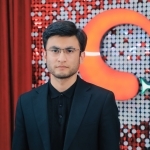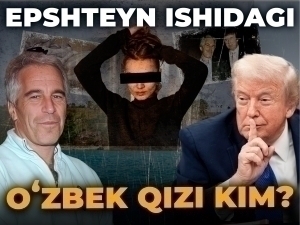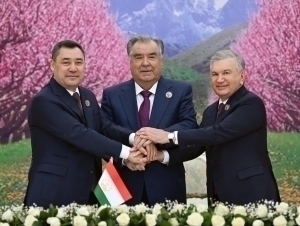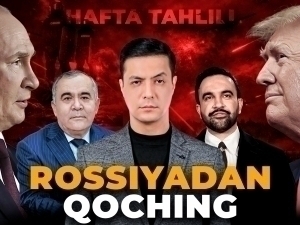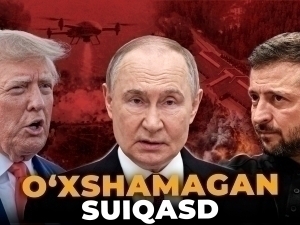Aliyev describes Baku as unequal in the Transcaucasus, Zelensky hints at a possible ceasefire, and Putin stays firm
Review
−
04 January 2025 12628 10 minutes
New Year greetings from presidents to their people. It seems that the greetings should consist of a collection of achievements achieved during the past year, plans for the new 365 days ahead, and other good intentions. However, at a time when the world is experiencing serious political crises, it is natural that this end-of-year address by heads of state to the people will not pass without bitter messages. Therefore, as 2024, full of invasions and genocides, ends and 2025 begins, the New Year greetings from the leaders of most post-Soviet states do not consist only of achievements achieved during the year. While Putin and Zelensky, as expected, devoted most of their speeches to military goals, Azerbaijani President Ilham Aliyev suddenly emphasized that he was “dominating” the Transcaucasus. Tokayev, on the other hand, called May 9, which for countries other than Russia is actually dedicated to memory and remembrance of the dead, “Victory Day,” as the Kremlin understands it, and announced that it would be widely celebrated in 2025. Below, we will dwell on the hints that these and other heads of state made in their New Year’s greetings for the current 2025.
Zelensky hinted at a ceasefire. Putin did not
In his New Year’s address, Zelensky said that Kyiv was ready to do everything to end the war in 2025. He said that peace would not be given to Ukraine, but that to achieve this, he would fully mobilize all available resources to stop Russia and end the war. Zelensky recalled that negotiations on Ukraine's accession to the European Union began in June 2024, and said that official Kyiv would continue its European aspirations.
"Ukraine will be in the European Union, and one day Ukraine will be in NATO and will strengthen the alliance. I, all of us, must fight for a strong enough Ukraine, because such a Ukraine will be respected and heard both on the battlefield and at the negotiating table," Zelensky said.
In turn, Zelensky's speech was met with despair by the Kremlin propaganda machine. They cited the opinion of former CIA analyst Larry Johnson, who said that Zelensky "completely does not understand what is happening around him and is disconnected from reality."
Russian President Vladimir Putin also did not shy away from military issues in his New Year's address. He noted that this year marks the 80th anniversary of the USSR's victory in World War II, and noted that 2025 has been declared the "Year of Defenders of the Fatherland" in Russia. In his speech, the Russian leader also spoke about sovereignty, historical events, and the fate of Russia. Speaking about the past, Putin said that Russia has set itself ambitious goals and achieved them, which it can already be proud of. However, he did not specify what achievements he was talking about. Putin did not give any specific indications about ending the occupation that he started and has been going on for three years. However, the current situation in Russia's New Year's celebration shows that the country is not really at peace and that the occupied citizens have significantly limited their opportunities for entertainment. For example, Moscow celebrated the New Year without fireworks for the third time in a row. It is noted that the city authorities made this decision against the backdrop of the ongoing war between Russia and Ukraine. In addition, about a dozen regions of Russia have also introduced restrictions or complete bans on the use of pyrotechnics.
Aliyev claims his "hegemony" in the Transcaucasus
Among the New Year's addresses of the leaders of the post-Soviet states, the one of Azerbaijani President Ilham Aliyev attracted considerable attention. After the events surrounding the downing of an Azerbaijani plane in Aktau, which was allegedly caused by Russia, Aliyev, who gave a master class to many heads of state on how to deal with Putin and proved to everyone that it is possible to even force him to apologize, devoted almost the entire part of his New Year's address to Armenia. He noted that many important events had taken place in 2024, among which, in particular, the liberation of four villages in the Gazakh district, occupied in the early 1990s, through political means, without firing a shot. However, Aliyev also stressed that the main role in achieving this achievement was played by the absolute dominance of official Baku in the tensions between Azerbaijan and Armenia over the past four years, and that without this dominance, Armenia would never have voluntarily returned these villages.
“They were forced to do this. They realized our political and military strength. I hope Armenia will continue to take into account the new realities that have emerged in the South Caucasus and the world in its policy. We created new realities in the South Caucasus. The Patriotic War created these realities, the restoration of our state sovereignty further strengthened them, and we confirmed the new realities that we created in the South Caucasus on the diplomatic, international, and political levels. The whole world has accepted these new realities,” said Aliyev.
Aliyev emphasized that Armenia’s defeats from 2020 to 2023 should serve as a wake-up call, urging Yerevan to acknowledge that it will never be militarily stronger than Baku. He noted that he had repeatedly warned Armenia, both in official statements and during negotiations, to avoid a dangerous path, as such actions were ultimately futile. According to Aliyev, no military force in Transcaucasia can compete with Azerbaijan today. He also reminded that the thirty-year occupation, the destruction of Karabakh and Eastern Zangezur, the Khojaly genocide, and the displacement of one million citizens due to Armenia’s actions would never be erased from Azerbaijan's collective memory. Aliyev concluded his remarks by once again urging the Armenian leadership to retreat from its current trajectory, asserting that Yerevan could not compete with Baku in any military or other domain. He emphasized that those seeking to undermine Azerbaijan would continue to fail.
Tokayev continues to perform his balanced position
Since the onset of Russia’s invasion of Ukraine, Turkish President Erdogan has been recognized as one of the most adept leaders in balancing relations between Russia and the West. However, Kazakhstan's President Kassym-Jomart Tokayev has also skillfully navigated this delicate balance. Unlike Erdogan, Tokayev’s primary motivation for maintaining neutrality between Russia and Ukraine is security, specifically the safeguarding of Kazakhstan’s interests.
Kazakhstan shares the world’s second-longest land border with Russia, stretching 7,644 kilometers. This border is especially sensitive as the majority of its inhabitants are Russian-speaking, making the region vulnerable to potential Russian expansion under the guise of protecting Russian-speaking populations. Therefore, Tokayev is focused on pragmatically managing relations with both the West and the Kremlin. Minimizing the risk of conflict with Russian President Vladimir Putin is a key priority for Tokayev, given Kazakhstan’s geopolitical positioning.
Tokayev’s New Year address highlighted key domestic achievements, including the country's historic increase in average life expectancy to 75 years. He also mentioned the 2024 referendum on building a nuclear power plant, which saw overwhelming public support. Looking ahead, Tokayev emphasized that 2025 would mark the 80th anniversary of the Great Victory, a celebration largely endorsed by the Kremlin. The decision to commemorate this milestone on such a grand scale stems from a November 2024 summit of CSTO member states in Astana, where Putin invited the leaders of the organization to attend the May 9, 2025 celebrations in Moscow. Military units from CSTO countries, including Kazakhstan, may participate in the parade on Red Square. A separate agreement on the celebrations was among the 14 documents signed at the summit.
Lukashenko also sent New Year's greetings as a "president"
Lukashenko also sent New Year's greetings as a "president." Along with other heads of state, Belarusian President Alexander Lukashenko delivered his New Year's address. In his speech, he used vivid metaphors, stating, “Life is like music; it sounds in different notes, on different keys, and we must always tune in to the best one by helping each other.” Lukashenko highlighted that the flight of the first cosmonaut in the history of sovereign Belarus earlier this year was another significant milestone for the country. He also briefly addressed the upcoming presidential elections scheduled for 2025.
"Soon, we will have to choose the future of the state. We all want it to be successful and happy. And, of course, peaceful!" said Lukashenko.
The presidential elections in Belarus are set for January 26, 2025. Lukashenko, unsurprisingly, is a candidate in this election, marking his seventh run for president in the history of independent Belarus. Seven! Such a result would likely please even Russian President Vladimir Putin. However, only one of the six elections Lukashenko has won to date has been positively received by a significant portion of the international community. The results of the 2020 election posed a major challenge for Lukashenko, who has been clinging to power in Minsk since 1994. After the 2020 presidential election results were announced, mass protests erupted, and opposition leader Svetlana Tikhanovskaya rejected the outcome. As the situation escalated, Lukashenko used all available administrative resources. Specifically, he ordered the large-scale shutdown of the Internet across the country, deployed police forces against peaceful protesters, and even saw Putin threaten to send Russian troops into Belarus if the protests turned violent. Ultimately, it was not the Belarusian people but most likely Putin and other power structures that granted Lukashenko another mandate for his weakening political tenure. However, the widespread discontent forced Lukashenko to return to a more authoritarian approach. In December 2021, a new draft constitution was developed that would prevent one person from serving more than two terms as president. Lukashenko acknowledged the need for constitutional changes and expressed his willingness to transfer certain presidential powers to other branches of government. However, the outbreak of the war in Ukraine revealed that, for a dictator, wars often serve as an “elixir of youth.” It is unlikely that Lukashenko is currently focused on the positive changes outlined in the draft constitution, considering the ongoing conflict in Eastern Europe. His primary concern remains the peaceful conduct of the upcoming elections, free from opposition. Systematic preparations and even pressure have already begun. Specifically, Lukashenko has threatened to shut down the Internet if unrest arises this year, as it did in the 2020 elections.
“If this happens again, we will completely turn off the Internet. Frankly, this has almost always happened with my permission. We had two problems, and we had to measure them ...,” said Lukashenko.
According to some sources, ahead of the elections, security forces have been instructed to “filter” individuals likely to protest during the vote. Reports suggest that a list of individuals targeted for pre-trial search and detention has been compiled in various regions. Security forces are also tasked with ensuring that the elections proceed "without any untoward incidents," including the distribution of protest leaflets, demands for a transparent vote count, or demonstrations against Lukashenko’s candidacy.
Emomali Rahmon did not send New Year's greetings for the first time
Emomali Rahmon did not send greetings for the first time. Among the recent New Year greetings from the leaders of post-Soviet countries, the absence of a message from Tajik President Emomali Rahmon was particularly noteworthy. This marks the first time in Rahmon's 30-year tenure that he has skipped sending New Year’s greetings. Despite this, the head of state did not leave the Tajik people without a message. Instead, his son, Rustam Emomali Rahmon, the chairman of the National Council of the Republic of Tajikistan and the mayor of Dushanbe—essentially the "heir to the throne"—took on this role. Additionally, Uzbek President Mirziyoyev and the leaders of other regional countries also sent their New Year greetings to their people.
Live
All